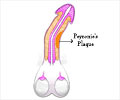Autophagy is a key cellular auto-cleaning mechanism. It mediates the formation of amyloid beta plaques, one of the hallmarks of Alzheimer’s disease. It might be a potential drug target for the treatment of the disease, concludes new research from the RIKEN Brain Science Institute in Japan. The study sheds light on the metabolism of amyloid beta, and its role in neurodegeneration and memory loss.
In a study published today in the journal
Cell Reports, Drs. Per Nilsson, Takaomi Saido and their team show for the first time using transgenic mice that a lack of autophagy in neurons prevents the secretion of amyloid beta and the formation of amyloid beta plaques in the brain. The study also reveals that an accumulation of amyloid beta inside neurons is toxic for the cells.
Alzheimer’s disease, the most common form of dementia, affects nearly 36 million people worldwide, and this number is set to double over the next 20 years. However, the causes of the disease are not well understood and no disease-modifying treatment is available today.
Patients with Alzheimer’s disease have elevated levels of the peptide amyloid beta in their brain and amyloid beta plaques form outside their neurons. This accumulation of amyloid beta causes the neurons to die, but until now the underlying mechanism remained a mystery. And whether the elevated levels of the peptide inside or outside the cells are to blame was unknown.
Source-Eurekalert
















